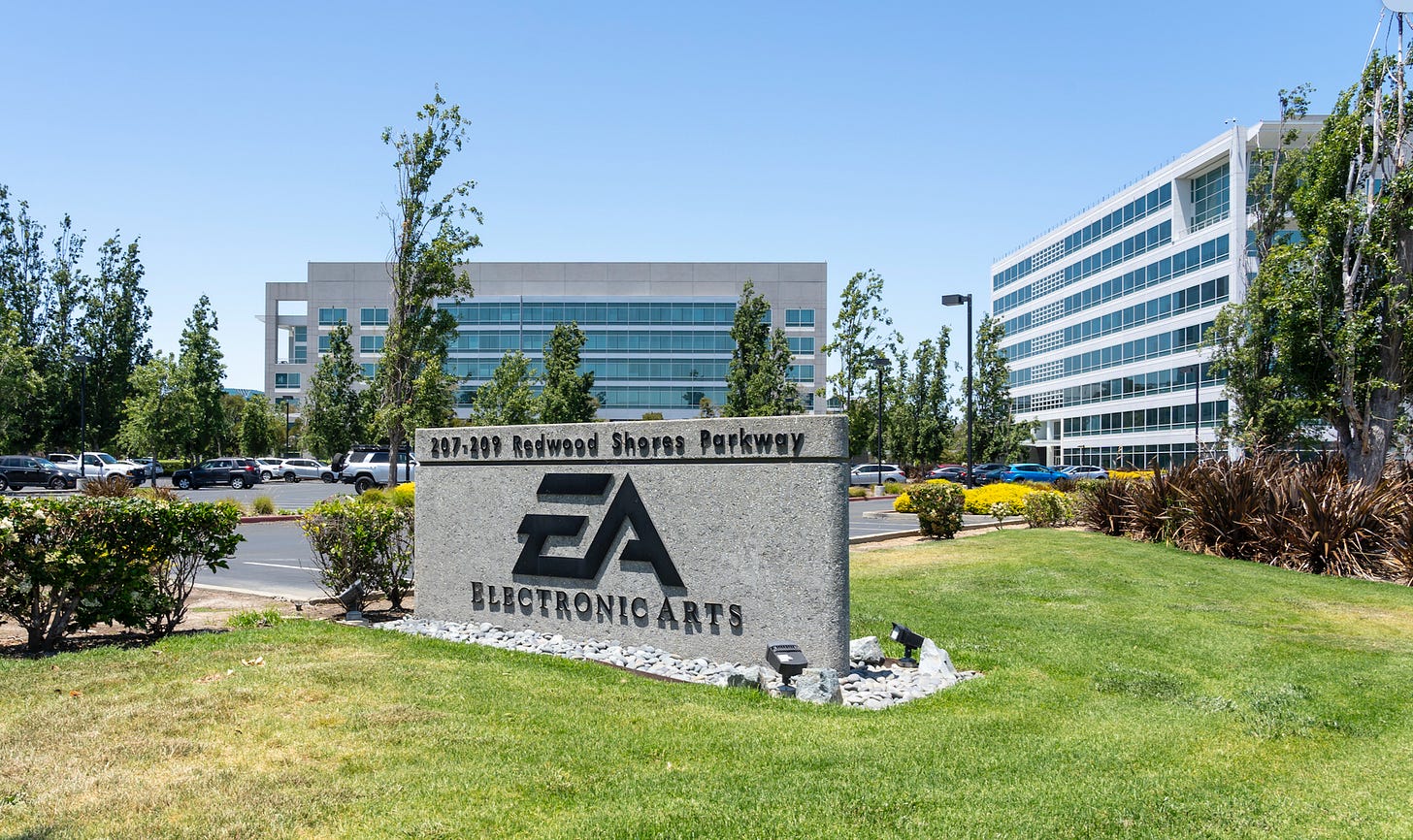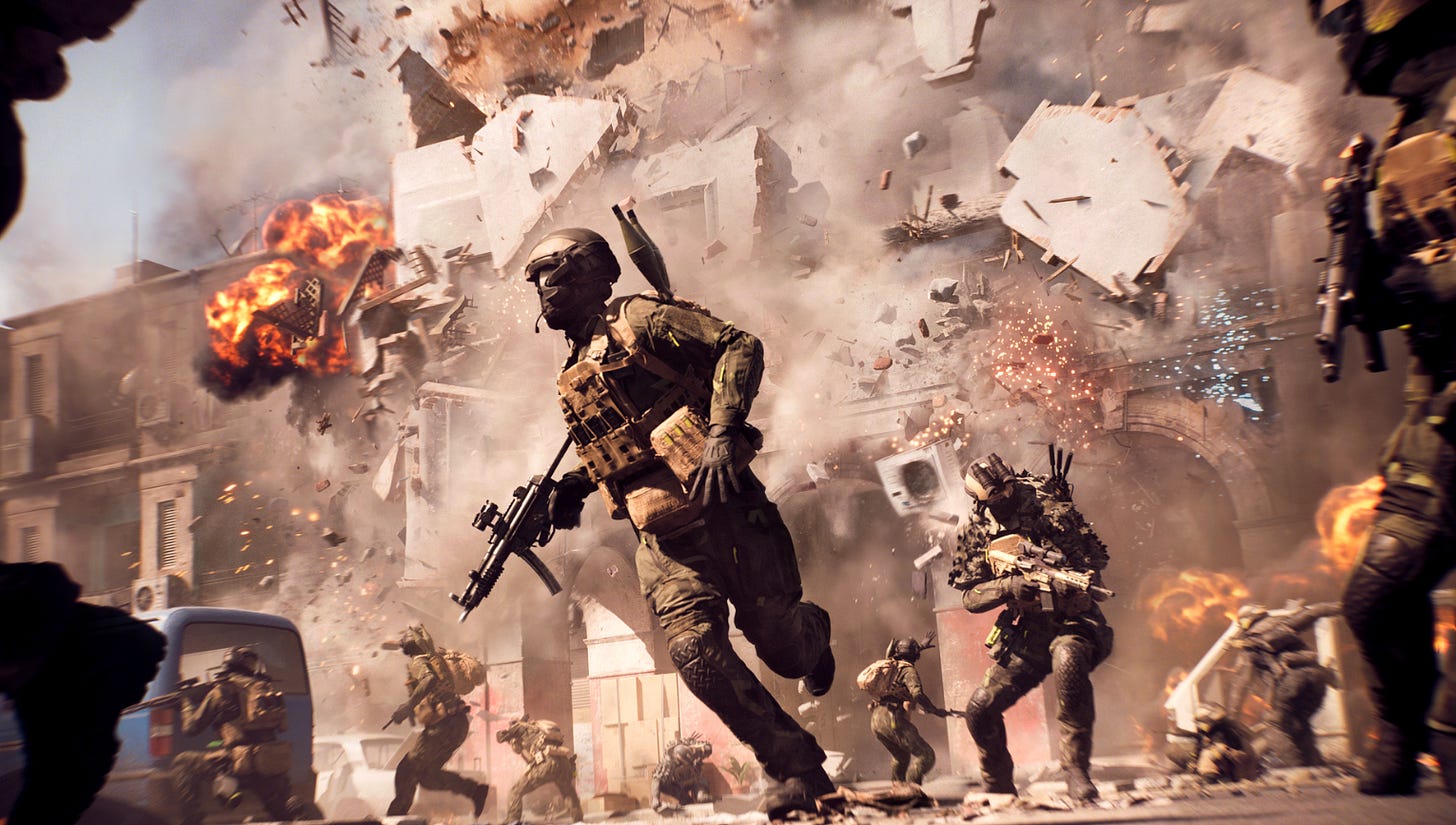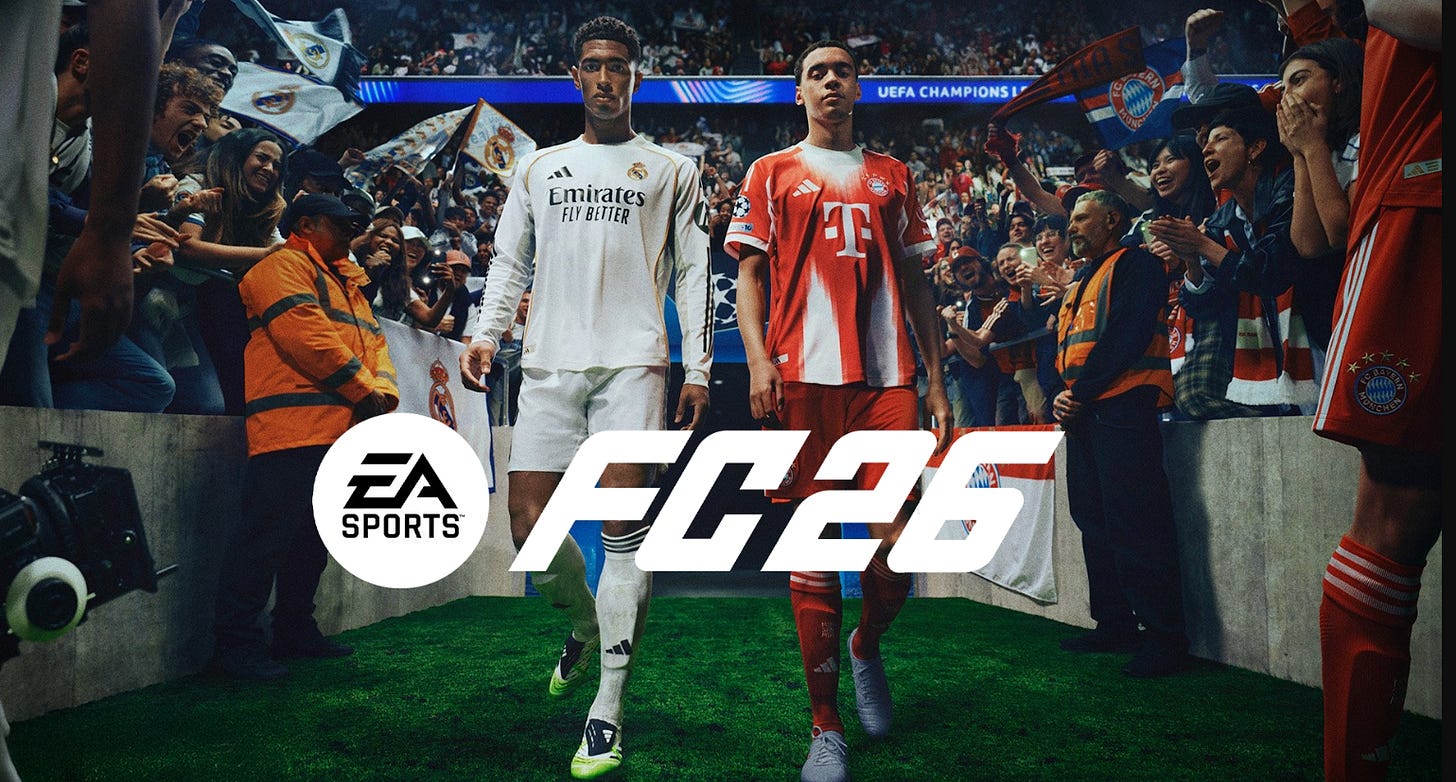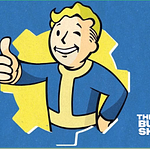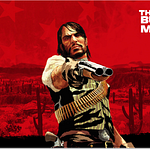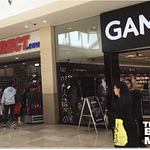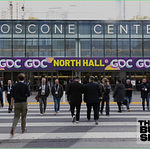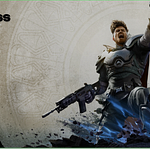Listen now on Apple, Spotify or YouTube
In This Edition
- What to make of the EA sale
- Battlefield 6 vs Call of Duty: Black Ops 7
- Xbox Game Pass price rise
Hello, and welcome back to The Game Business.
It’s been a significant week for the video game industry, headlined by the acquisition of EA by a new investment group, led by Saudi Arabia’s Public Investment Fund.
Meanwhile, Xbox significantly raised the price of Game Pass Ultimate. And there have been lay-offs at European studios Funcom, Starbreeze and Avalanche.
On this week’s Show, I am joined by analyst, author and all-round nice guy Joost van Dreunen to discuss some of these developments, and we also analyse the upcoming showdown between Battlefield and Call of Duty.
You can watch and listen to the whole thing above (or via your podcasting platform of choice). Alternatively, I’ve given my take, and shared the data from the podcast, below.
Enjoy!
About that EA deal…
When the news was confirmed that EA was being sold to a group of private investors in a $55 billion deal, I had many thoughts.
Most of them were around the possible synergies between EA and its future sister companies, the long-term implications of a leveraged buyout, and the future financial potential of Electronic Arts.
But just writing about that seemed a bit incomplete. Because as Joost van Dreunen wrote earlier this week, the numbers just don’t add up. The offer almost values EA at 20 times its annual cash flow. There’s clearly something more at play.
This deal is about Saudi Arabia. This is about using the cultural power of games to shift its reputation and perception both locally and internationally. This is about building up a game development industry within that country. And it’s about the Saudi’s history with the Trump administration, and particular Jared Kushner.
Ultimately, this is about powerful men and regimes using our industry for political and economic gain.
(If you want to get a real understand of this, I must recommend George Osborn, who is literally writing a book on this very subject. He’s also just done a superb newsletter that I am sure you’ll find informative… if a bit depressing.)
All of this does mean any typical business analysis is hard to do. There’s a huge $20bn debt that needs servicing as a result of this acquisition, and so you would expect to see some rationalization (whether that’s through redundancies or selling of IP/studios). The instinct is to worry for teams like BioWare and EA Motive, which aren’t making sports games or shooters, and are working on single-player projects with less financial upside (namely Mass Effect and Iron Man).
But this is a political deal. This is partly about changing a narrative. And what statement would it send if these investors immediately started closing or hacking away at beloved game studios? Might EA’s new owners want these teams to make things that aren’t necessarily going to deliver huge returns, but could offer other political and cultural benefits?
That thinking takes us to other political areas of concern. Considering the conservative leanings of this investment group, what does that mean for games like The Sims, or Mass Effect, which are openly diverse? How involved will these investors be in EA’s green light and creative processes?
There is understandable fear around this deal across the wider industry. Consolidation hasn’t been kind to the game business in recent years. But for now, all we can do is hope and see. And keep a close watch on what influence these Saudi Arabian backers might have on one of America’s most influential entertainment companies.
Will Battlefield 6 end Call of Duty’s 16-year reign at the top?
From the political to the commercial, and our big analysis of the week is on the shooter showdown between EA’s Battlefield 6 and Activision Blizzard’s Call of Duty: Black Ops 7.
It’s not an easy one to analyse. As an annual franchise (and one that is now within the Game Pass subscription service), Call of Duty’s pre-release hype is more akin to a sports game, and typical buzz metrics like Wishlist numbers won’t tell you much.
Also, as live service multiplayer games, the success of both titles will depend more on what happens after launch.
Having said that, data suppliers from Ampere, Circana, Newzoo, Press Engine and Video Game Insights have provided us with some fascinating insights that suggest we may be looking at a banner launch for Battlefield 6. So, let’s take a look.
Where do things stand?
According to Circana’s Retail Tracking Service for the period January 1995 through to July 2025, Battlefield is the No.16 biggest game franchises in US history (full game dollar sales). It’s behind Need for Speed but ahead of The Sims. Call of Duty is No.1.
The biggest Battlefield US launch is 2016’s Battlefield 1 (slightly ahead of Battlefield 4). It was the No.2 game of the year in the US in terms of full game dollar sales. What was No.1? Call of Duty: Infinite Warfare.
2018’s Battlefield 5 was only the No.16 game of the year in the US. 2021’s Battlefield 2042 performed better at No.5, but it was actually behind two Call of Duty games (Call of Duty Vanguard at No.1 and Call of Duty: Black Ops Cold War at No.3).
Call of Duty was the best-selling game franchise of 2024 in the US, which was the 16th consecutive year it’s achieved that. Games like GTA 5, Red Dead Redemption 2 and Hogwarts Legacy have previously finished as the year’s best-selling individual game, but as a franchise (so including multiple titles) Call of Duty was No.1.
In conclusion, Circana data shows that although Battlefield got close once (nine years ago), Call of Duty is the dominant power in the US.
What happened with the Battlefield 6 Beta?
Ampere estimates there were 22 million people who played the Battlefield 6 Beta, whereas Newzoo has that number slightly higher at 25 million.
According to Newzoo, the peak daily active user number for Battlefield 6 was 10.4m. By comparison, the Battlefield 2042 Beta peaked at 5.1m.
The total number of Beta players for Battlefield 2042 was 5.7 million (Newzoo estimates), which is well below the 24.7 million for Battlefield 6. Note: The Battlefield 2042 Beta was just 4 days vs 8 days for Battlefield 6.
Video Game Insights says that Battlefield 6 crossed two million Steam Wishlists within weeks, and that number is currently on 2.4 million. That’s three times the level of Call of Duty.
Ampere estimates that the game has 1.7 million Steam pre-orders.
For July 2025, Ampere looked at the share of Call of Duty players who also played the Battlefield 6 Beta, and whether they went back to Call of Duty afterwards. For this group of players (this is purely people who played both games), 29% on Xbox didn’t return to Call of Duty in August, 24% on PlayStation didn’t return, and 48% on Steam didn’t return. Therefore, Ampere predicts that disruption for Call of Duty this year will likely be more severe on Steam than consoles.
How is the media reacting?
The buzz around Battlefield 6 has certainly influenced media coverage. Since Battlefield 6 was formally revealed in July, 13,088 press articles have been written about the game across all publications (Press Engine data). This is close to Call of Duty: Black Ops 7, which has 13,068 articles, but Black Ops 7’s data also includes June (when the game was revealed).
“Comparing Call of Duty to Battlefield is like comparing American football to soccer: they may look the same, but they’re fundamentally different sports”
What do the numbers mean?
Call of Duty’s figures aren’t telling us much. It’s a steady performer with a large audience base, but its annual cadence means it’s hard to judge the level of excitement for this year’s entry.
However, Battlefield 6 clearly has huge momentum. Ampere believes the game will sell five million units in its first week, and the excitement for the game is growing as we near its October 10 launch. It’s pretty much guaranteed a big day one, and if it can deliver a strong start, that will likely have a knock-on effect on Call of Duty (which arrives over a month later).
But how big of an impact? Battlefield and Call of Duty are both military shooters, but their central appeal is different. Battlefield is about large maps, vehicle combat and team-based battles. Call of Duty is more close quarters, fast-paced and with smaller maps. As Joost van Dreunen said on the show this week, comparing Call of Duty to Battlefield is like comparing American football to soccer (or football, as we call it): they may look the same, but they’re fundamentally different sports.
Battlefield does have some more Call of Duty-like elements this time around, and they are clearly targeting similar audiences in general. But if you prefer the Call of Duty-style experience, then Battlefield is unlikely to be a satisfying alternative.
Regardless, it is exciting to see two high quality military shooters coming out strong this year (particularly in the absence of GTA 6). They both have a nice window between each other, giving players a chance to experience both (remember, Call of Duty is also available within Game Pass). And looking at the early metrics for Battlefield 6, there is reason for believe that this year, maybe, EA will seriously challenge Activision for that No.1 crown.
The official European charts come to The Game Business
From this Friday, The Game Business will begin reporting on the European charts data, covering digital and physical game sales.
We’ve worked with GSD and Video Games Europe to publish regular weekly charts, with some additional insight on the top sellers across Europe (plus Australia and New Zealand).
Countries included in the chart are Australia, Austria, Belgium, Denmark, Finland, France, French Guiana, French Polynesia, Germany, Guadeloupe, Italy, Martinique, Netherlands, New Caledonia, New Zealand, Norway, Poland, Portugal, Reunion, Russia, Spain, Sweden, Switzerland and the UK.
The charts will cover Units and Revenue, plus we will have data on the most watched games of the week, too.
And as a taster, here are last week’s Top Ten sellers across Europe.
European Top Ten Unit Sales (week ending September 21)
1. EA Sports FC 26 (New Entry)
2. Borderlands 4 (-82%)
3. Grand Theft Auto 5 (-11%)
4. Hogwarts Legacy (-8%)
5. NBA 2K26 (-51%)
6. Red Deard Redemption 2 (-15%)
7. Skate (New Entry)
8. Grand Theft Auto Online (-6%)
9. Assassin’s Creed Shadows (-4%)
10. Mario Kart World (-29%)*
European Top Ten Revenue (week ending September 21)
1. EA Sports FC 26 (New Entry)
2. Borderlands 4 (-84%)
3. NBA 2K26 (-52%)
4. Mario Kart World (-31%)*
5. Skate (New Entry)
6. Assassin’s Creed Shadows (-10%)
7. Grand Theft Auto 5 (-7%)
8. Metal Gear Solid Delta: Snake Eater (-48%)
9. Red Dead Redemption 2 (-8%)
10. Hogwarts Legacy (-8%)
*Digital data unavailable
For more on the GSD data and how to acquire the information yourself. Head to gamesalesdata.com
That’s it for today’s edition. We’ll be back Monday with The Game Business Micro (available only to paid subscribers). And our delayed bumper video celebrating 30 years of PlayStation in Europe is now scheduled for Tuesday. Thank you for reading!



